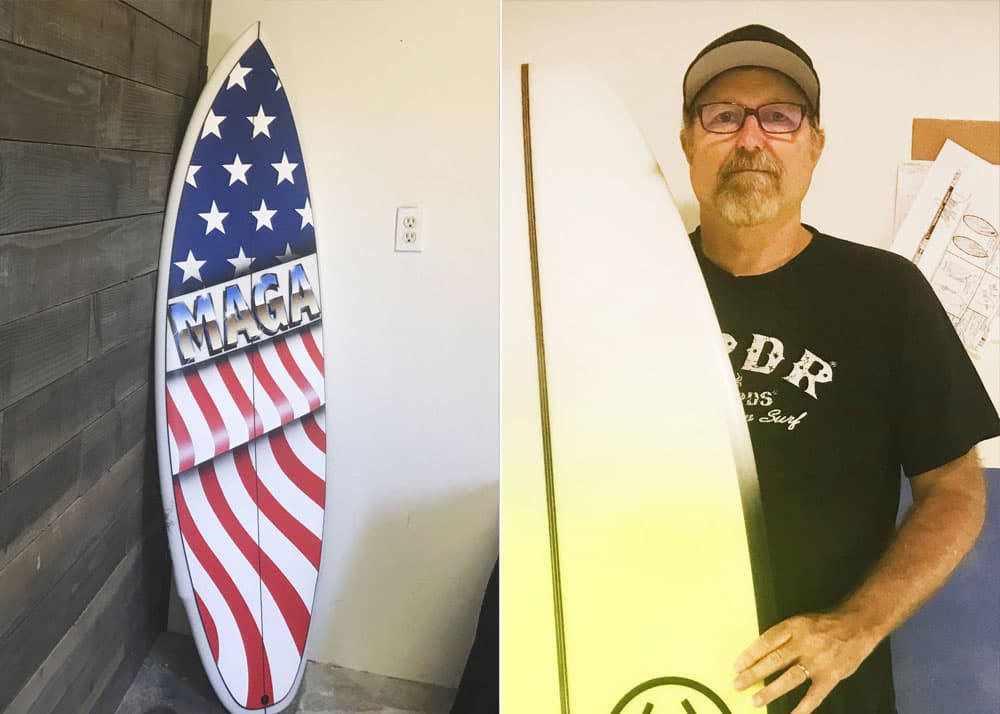Dennis Jarvis, Spyder Surf CEO and his MAGA surfboard
Karen James | CNBC
HERMOSA BEACH, Calif. — Inside Dennis Jarvis’ small workshop, the noise is almost deafening as he buffs and smooths the hard styrofoam before him on a recent afternoon.
He’s a surfboard maker — or shaper, as they are called in the industry — and he’s one of the best in the business. It’s a dying craft here along these sunny California beaches. But Jarvis hopes the tide will turn once President Donald Trump’s latest round of tariffs takes effect in just a few days.
The administration will slap tariffs on roughly $300 billion in imported goods starting Sept. 1. The rate originally proposed was 10%, but Trump raised it to 15% last week.
Jarvis said he thinks it should be even higher, to help level the playing field.
Dennis Jarvis, Spyder Surf CEO
Karen James | CNBC
“I work my butt off to make a top-quality board,” Jarvis said as he meticulously shaped the surfboard’s core, known as a blank, in the confined quarters of his workshop.
A former pro surfer, he began building his own boards under the brand Spyder in the late 1970s and turned it into a thriving manufacturing and retail business. The average price for a Spyder board is $650, and Jarvis has sculpted boards for celebrities including Taylor Swift and the Jonas Brothers.
During the mid-1990s, at the height of his business, Spyder was turning out up to 15,000 boards a year. Now, he works alone in his shop and produces about 1,000 a year.
Jarvis estimated the Great Recession wiped out about 2,500 domestic shapers. Now, there are fewer than 50 left. Instead, much of the production has moved overseas — in particular, to China.
“There are a number of businesses that have found that doing their manufacturing outside of the country allows them to offer a product that has a lot of innovation put into it, a lot of creativity,” said Sean Smith, executive director for the Surf Industry Manufacturing Association, or SIMA. “They’re able to produce that at a lower cost than they could here in the U.S.”
Jarvis said manufacturers in the U.S. are at a competitive disadvantage. Imported boards are lower quality than his custom designs, he said, and they sell for much less — sometimes as much as $400 less. He said this directly results in the loss of jobs and substantial decline in revenue.
Jarvis said forcing importers who purchase surfboards overseas to pay tariffs will increase the cost of foreign boards, bringing them to a price point that is more in line with those built in the U.S. It costs him hundreds of dollars in import duties to ship his products out of the U.S. to places such as Australia, Jarvis said, yet there are no import duties at all on surfboards entering U.S. ports.
“I’m not angry at the guys who are doing this but angry at the U.S. for allowing it,” he said. While the new 15% tariffs are a start, he said they go as high as 70%.
China now dominates the U.S. surf market in volume and value. In 2018, the U.S. imported more than 916,000 surfboards, according to data from the U.S. Census. About 67% of imports came from China. They were valued at $35 million.
A 2013 industry survey found that 31% of boards sold at specialty retail shops in the U.S. were imported. Now, SIMA estimates imports have risen to 35%.
“There is a place in our industry for both the domestic shaped and manufactured board and an internationally made board to exist,” said Smith. “We just don’t believe there is justification for a tariff just because the product is made in China.”
Marcelo Malinco is a buyer for Dive N Surf shop in Redondo Beach, California. He said every shop has a different customer base, and his shop tries to cater to those who come in. At his store, 75% of the boards sold are imported.
“Our customers are seeking a variety of boards,” Malinco said. “It helps customers find a better deal as opposed to here in this country where it costs so much more to make them.”
Jarvis also owns three surf shops in the area, and he concedes that his shops also sell boards from overseas. He called it the reality of the business if he wants to stay afloat.
“I’m focused on my own fight. And my fight is real. There is no margin on surfboards unless I make it in Vietnam or … China, in which case your margin is huge,” said Jarvis. “I’m a capitalist.”
Smith said the members of his association are working with Chinese factories on subsidies that can be offered to mitigate costs. He’s hoping the consumer and retailer will not have to bear the brunt of the new 15% tariffs.
“The Chinese do not want to lose the business to other parts of the world,” Smith said. “They’ll reduce their pricing, they’ll reduce their margin, because they’re willing to wait out this trade war in hopes that it will settle down.”
